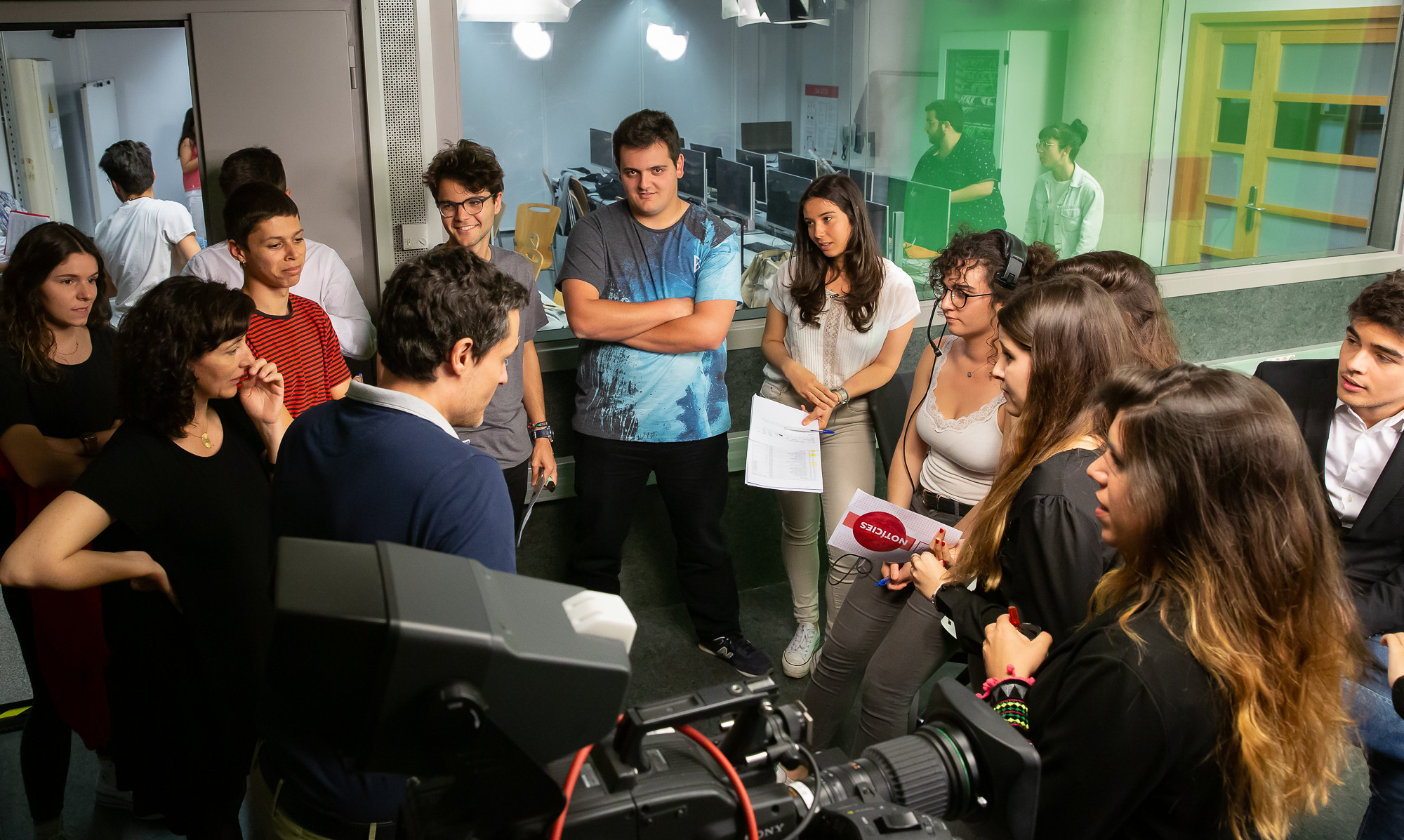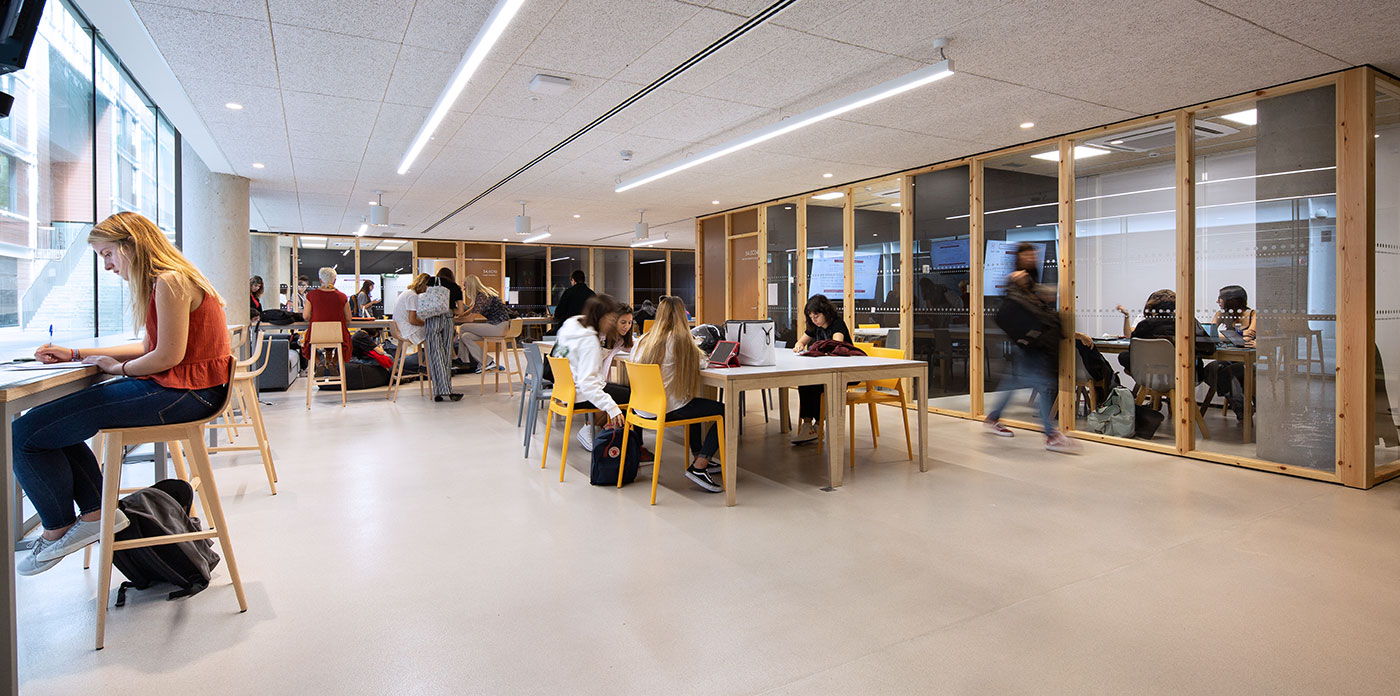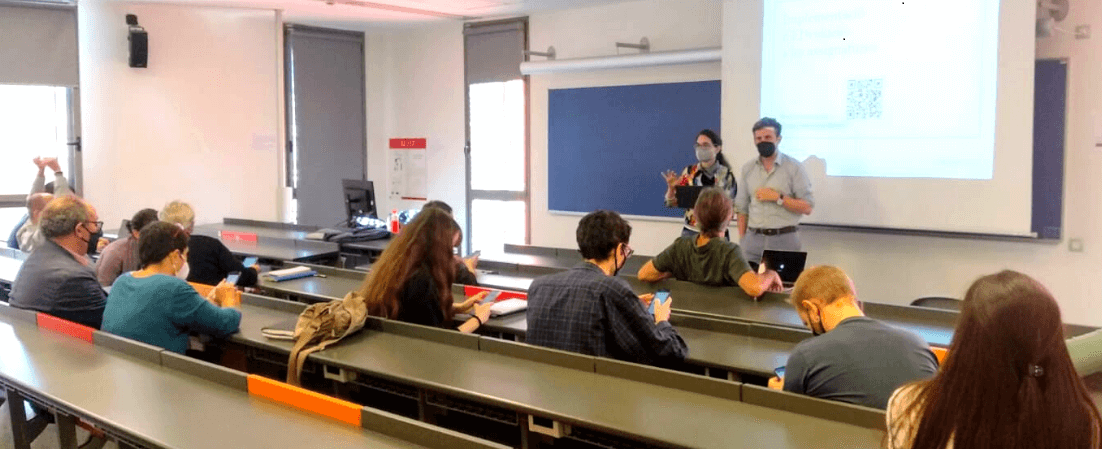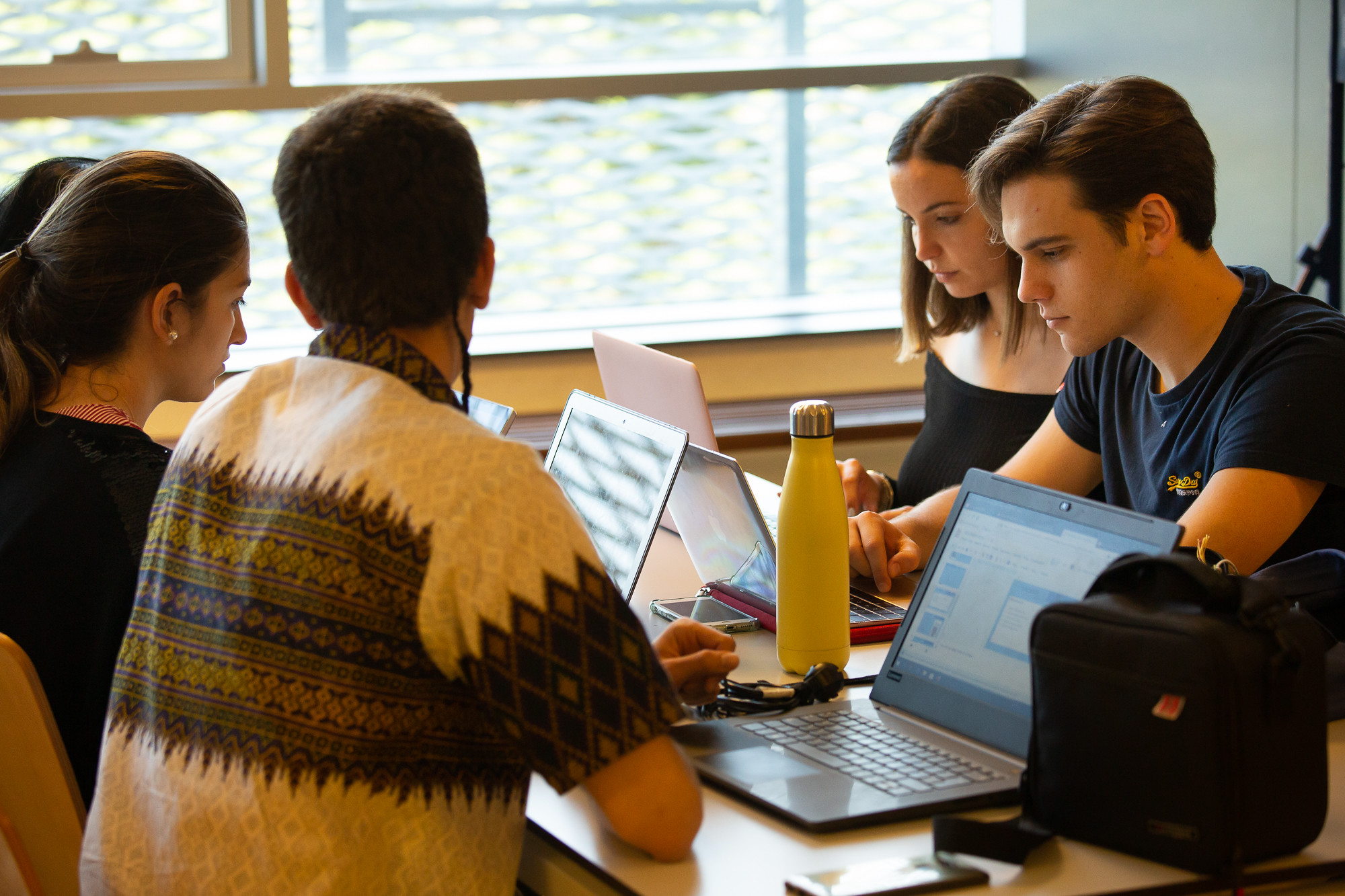EDvolution’s catalysis reaches the subjects of UPF, immersed in a process of transformation and innovation
EDvolution’s catalysis reaches the subjects of UPF, immersed in a process of transformation and innovation
88 undergraduate subjects spread among all University faculties and centres, with an overall impact on 5,378 students, have achieved the EDvolution seal in their Aula Global at the end of the 2021-2022 academic year. This recognition highlights the good academic practices and the commitment by teaching staff to the new Common Educational Framework after participating in the training and support offered by the Center for Learning Innovation and Knowledge (CLIK).

In mid-July 2018, Josep Lluís Martí, then vice-rector for Innovation Projects, presented the new educational model EDvolution, a project that was in its gestational phase, as part of the teaching excellence summit organized by Times Higher Education at the University of Glasgow. It was the first time in its history that UPF had reflected on what its educational and pedagogical model should be like, to truly become an institution for social impact and transformation. After four years, EDvolution is in the process of consolidating, deploying and launching the different initiatives that comprise it, after a lengthy process of collaboration, which has involved many people from the different communities of the University, as well as people from outside the Institution.
Manel Jiménez: “EDvolution is a model designed so that the student can obtain a global vision of the world and deal with it autonomously, proactively, with high degree of technological competence and excellent communication skills”
The EDvolution Common Educational Framework, which began to be created in 2017 during the term of rector Jaume Casals, whose successor is Oriol Amat, brings together all UPF’s teaching innovation projects and initiatives. Driven by the Center for Learning Innovation and Knowledge (CLIK), it includes several dimensions. One fundamental one is the consolidation of quality teaching through existing practices, and the transformation, innovation and improvement of subjects. This facet of the 2021-2022 academic year has taken a very important step, with the first subjects of undergraduate degree programmes to be awarded the new EDvolution seal, a process that is to continue next academic year.
However, other projects should be added to this aspect such as the cross-disciplinary programmes (Minors, Open Degree, UPF Sènior, Campus Júnior, etc.), the UPF Passport, the creation of knowledge communities, the Learning Labs, and all the initiatives that are carried out in the Tallers Area of the Poblenou campus, such as En Residència or the Diari de Barcelona, among others.
According to Manel Jiménez, vice-rector for Educational Transformation, Culture and Communication, “EDvolution is a model designed so that the student can obtain a global vision of the world and deal with it autonomously, proactively, with high degree of technological competence and excellent communication skills”. And he adds: “There is a change in the institutions and in society in which learning permeates all areas, with social pressure to transform how to learn”.
For this reason, the EDvolution Common Educational Framework (which is expected to be fully implemented in three years’ time, coinciding with the end of rector Oriol Amat’s mandate) is characterized by its cross-disciplinarity, flexibility when offering academic content, the enhancement of learning and knowledge generation strategies, collaborative work with society and the industrial fabric, a global vision with planetary wellbeing and the sustainable development goals (SDGs) and the integration of teaching and research.

88 subjects have obtained the EDvolution seal in the 2021-2022 academic year
This academic year, the CLIK launched the first edition of the “Build your EDvolution Learning Plan” training programme, which began in October 2021 and ended in June 2022. Once the different participating members of teaching and research staff had completed it, a total of 88 subjects of undergraduate programmes have obtained the EDvolution seal.
These subjects, taught by faculty attached to the University’s eight departments, with teaching in all UPF faculties and centres, have had a global impact on 5,378 students (taking into account that a student can be counted several times if they study different subjects that have obtained recognition).
“Just as we are excellent in research, we also want to generate this excellence in our teaching, and at the same time, highlight the good teaching experiences that are already being carried out to put them at the service of the UPF teaching community. We must also bear in mind that the interrelationship between teaching and research is one of the hallmarks of EDvolution and that the model seeks to promote research methodologies and also the transfer of research outcomes to the classroom. The improvements planned and implemented are reflected in the incorporation of the EDvolution seal in the Aula Global of the subject”, Manel Jiménez points out.
The EDvolution seal is a recognition of the subjects that have been reflected on through the participation of teaching staff in the training and support provided by the CLIK
The EDvolution seal is a recognition of the subjects that have been reflected on throughout this academic year through the participation of teaching staff in the training and support provided by the CLIK. Participants have worked on their subjects (compulsory, optional, and free-elective) to underscore and highlight the most positive aspects, improve them, transform them or adapt them, in tune with the EDvolution educational framework.
What is the Learning Plan and how is it developed?
At the heart of the training provided by the CLIK is the “Learning Plan” (Pla d’Aprenentatge - PA) instrument, a reflective and complementary document of the teaching plan that sets out key aspects of each subject and aligns the objectives, activities, methodology and evaluation in a coherent and innovative manner.
“The Learning Plan includes an assessment plan and an activity plan. Among the elements contained in both plans are the common competences of UPF and the breakdown of the various proposed competency-based teaching-learning methodologies, adapted to the EDvolution model”, explains Ingrid Sabaté, pedagogue at the CLIK.

According to Ingrid Sabaté, “quality teaching must be evolving permanently. The teaching plan lists the elements contained in the subject, the `what’, but in most cases, the ‘how’ is not indicated. Thus, EDvolution aims to use an instrument that indicates not just the contents and competences that are worked on in the subject, but the way of doing it, the ‘how’, and this is what the Learning Plan seeks to develop”.
Ingrid Sabaté: EDvolution aims to use an instrument that indicates not just the contents and competences that are worked on in the subject, but the way of doing it, the ‘how’, and this is what is the Learning Plan seeks to develop”
The CLIK proposes several phases to start building the PA: the first phase consists of learning about EDvolution in order to align the subject to the Common Educational Framework, after the teaching staff detects the key elements to meet this requirement. Here is where UPF common competencies (autonomy, transdisciplinary and interdisciplinary knowledge, global citizenship, gender, communication and digital skills), the active methodologies (flipped classroom, problem/project-based learning, gamification, etc.) come into play and the different types of training activities aligned with the assessment system, among other elements.
In a second phase, taking into account the expertise in the subject, the faculty reflects on the aspects for improvement (incorporating active methodologies, working on the SDG, modifying the assessment system to make it more objective, etc.) and the reasons why they wish to implement this improvement (group management, motivation, student assessment, class participation or incorporating more innovative training activities).
The third phase, of defining and planning this innovation through the “Learning Plan” instrument, includes the preparation of an activity plan and an assessment plan. Subsequently, the teaching staff participates in a ‘peer review’ activity: “Peers review the Learning Plan and provide feedback for improvement. This generates synergies among faculty from different departments”, Ingrid Sabaté asserts. After the final delivery of the PA, the EDvolution team gives its final feedback.
Premises for the subjects to meet the requirements for the EDvolution seal

The premises that are taken into account in this process, and are met by the subjects awarded the EDvolution seal, are as follow: they put the student at the centre of their learning, through the common competencies of UPF; the incorporation of active methodologies; the design of learning activities to achieve deep and lasting learning, in line with hours of student dedication, and finally, the introduction of more sustainable and effective assessment systems for teachers and with an interest in teaching excellence.
Regarding the 88 subjects that have developed the Learning Plan and have obtained the seal, not all of these subjects have implemented the AP this academic year. In other words, “some have designed possible changes, but until next academic year they will not be able to apply this design”, Ingrid Sabaté stresses.
The Learning Lab, oriented towards research into the processes of knowledge acquisition and the improvement of teaching practices, has collected the different implementations of these subjects and is currently analysing the results to provide reasoned scientific support for the adjustments that can be made in the teaching practice.
What kind of support does the CLIK provide for the teaching staff?
The CLIK provides support to and advises teaching staff throughout the process, since once the Learning Plan has been presented, it must be implemented: “During this implementation phase, the CLIK can support the teaching staff if required, giving feedback to the inputs received from the student body. Subsequently, everything that has not worked will have to be adjusted, and if necessary, improved on: the CLIK will also provide support in this post-implementation reflection”, Ingrid Sabaté explains.
The CLIK pedagogue explains that the participants in the training given this academic year, which will continue next academic year, are eager to improve and innovate in their subject, and are looking for methodologies to revitalize the teaching and learning process to enhance the student's involvement, but sometimes they do not know how to do so: “The support from the CLIK both in reflection and in implementation allows seeing the existing possibilities of innovation according to the type of students, type of group, the specific year of the degree in which the teaching takes place... Once the faculty has completed the PA, it is grateful for the help received and optimistic about improving its teaching”, she concludes.
Some experiences of EDvolution put into practice
Several UPF teaching and research staff members have already put the EDvolution Common Educational Framework into practice in their subjects, with the support and advice of the CLIK, and they explain their experiences in a series of video capsules.
They have carried out this transformation and adaptation of the subjects, with satisfactory results, through various active learning methodologies, such as Problem-Based Learning (PBL), Research-Based Learning (RBL), Project Oriented Learning (POL), the flipped classroom, and gamification, among others. Below, we present in some examples.
Problem-Based Learning (PBL)
Andrea Noferini, a professor with the Department of Political and Social Sciences, explains how he uses PBL, a learning methodology in which the teacher presents the students with a real problem and helps them investigate the answer, leaving them to find the solution for themselves.
Research-Based Learning (RBL)
Vicent Climent Ferrando, a professor at the Department of Translation and Language Sciences, talks about how he applies RBL methodology in his classes. This is a working methodology with which the teacher incorporates the latest results and achievements of a given investigation into the contents of the subject.
Project Oriented Learning (POL)
Berta Alsina Español, a professor with the Department of Medicine and Life Sciences, explains her experience with this methodology and with debates with researchers. It is a system of work with which the student is responsible for their own learning, investigating and solving a hypothesis raised by the teacher.
Flipped classroom
Alberto Carrio Sampedro, a professor at the Department of Law, explains how he implements the flipped classroom. In this methodology, the student studies at home before the class and takes advantage of the experience in the classroom to consolidate the knowledge learned, through dynamics and practical cases.
Gamification
Àngel Lozano, a professor of the Department of Information and Communication Technologies, talks about his experience with the use of gamification. It is a technique that designs educational itineraries through actions and tasks, with mechanisms specific to games, in order to encourage student motivation.
